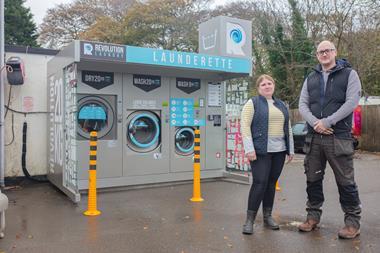Power struggle
Here’s the dilemma. If an energy company badly screws up by not having a meter working at your site and then sends you a bill for £7k after you have folded the business do you pay it or not? I think I know what most of you would say to that. But Jagdish Radia says he doesn’t like not paying his bills... he would just like it to be for what the site had actually used. I reported back in March that Jagdish had gone to the Energy Ombudsman over Scottish Power’s failure to supply a correctly working meter at his second site, Central Avenue Service Centre in Nuneaton, a year ago.
The saga of the non-working meter wobbled on for months with Scottish Power not showing up for various appointments to fit a new meter. Jagdish left the business after four months to concentrate on his other forecourt, Leaway Service Station in Birmingham.
The ombudsman found in his favour saying that the energy company needed to install an appropriate meter and then use the consumption on the current owner’s premises to work out the bill for Jagdish’s four months’ tenancy. There were hitches: the current owners had put in quite a lot of investment into chillers and opened for far longer hours than he did so their consumption was bound to be greater. (There was also the small matter of the meter which, up till the time of writing, has still not been installed so quite how they could compute an accurate usage is anyone’s guess).
Plus there was a short deadline and if he accepted the ombudsman’s terms it would be in full and final settlement.
Jagdish didn’t want to pay the VAT because he could no longer claim it back, so he continued to think about it until the deadline passed. Then in May he got a debt recovery letter from Oriel Collections demanding the £7k (Jagdish thinks it should be less than half that, at around £3,200). He disputed the debt and they asked for proof of dispute.
I contacted Oriel and sent them a copy of the column from our March issue. Meanwhile, Jagdish contacted Scottish Power again and asked how they expected him to pay when there was no meter? They suggested, after seeing the coverage in this magazine, that he should go back to the ombudsman and said that they would accept their findings. Jagdish says: "It’s a lot of stress. I’m not at all happy." He adds that the new owners are worried too.
Jagdish says that the company no longer trades and has no assets; his accountant has suggested just walking away from it. He might get a few threatening letters but that’s it.
I would also advise that Jagdish goes to Companies House and, having ceased trading, asks for his company to be struck off.
(You can close down your limited company by getting it ’struck off’, but only if it: hasn’t traded or sold off any stock in the last three months; hasn’t changed names in the last three months; isn’t threatened with liquidation and has no agreements with creditors, eg a Company Voluntary Arrangement.)
I think his former business at Nuneaton ticks all those boxes.
Tying up loose ends
We do like a happy ending but this one was s-o-o long coming. In the May issue I recounted the story of a bad split up between Akbar Aras and Jet (Phillips 66). He came out of his contract at the end of March and the company demanded £43,000 upfront for his final delivery. They gave him two hours to arrange this. It didn’t seem to count that his forecourt, Top Shop Services in Cannock, Staffordshire, had been doing business with them for the best part of 15 years or that Jet already had a bank guarantee for £110k. Or that on three occasions he had reminded them that they hadn’t taken deliveries, worth £42k each, out of his account.
He managed to raise the funds and I contacted the company. They sent very long apologies and explanations and a promise to review their payment and customer communications process.
However, by May 17 Akbar still hadn’t got his £110k returned so the bank continued to charge for it. It’s £800 per quarter to keep the guarantee in place. He got in touch with Jet again. Jet duly wrote to Barclays formally terminating the contract but hadn’t signed the letter. Cue another delay.
Now the happy ending I promised. The letter got re-sent just in time to meet Barclays deadline to prevent another charge. Barclays, says Akbar, were extremely amenable throughout.
And Akbar is very happy with his new supplier, Esso/Greenergy: "We instantly picked up volume."






























No comments yet